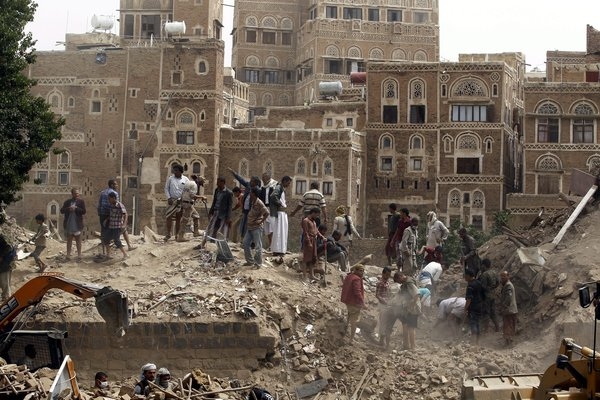Since 2015, the war in Yemen has pitted a coalition led by Saudi Arabia and the United Arab Emirates, supporting the UN-recognised government, against Ansar Allah (Houthi) rebels. Estimates put war deaths at up to 50,000, while a further 85,000 children may have died from hunger and preventable disease. The UN has said that up to 14 million people are threatened by famine and depend on humanitarian aid[1].
Following the seizure of the capital Sana’a by the Houthis in 2014, the group extended its power to much of the country. The Saudi-UAE coalition entered the war in 2015, seeking to counter the influence of the Houthis, who they accused of being tacitly backed by Iran – continuing the region-wide cold war. Both sides have been accused of perpetrating atrocities, including against civilians. The conflict receives relatively little coverage in the West, with Mwatana accusing Western governments of ignoring atrocities committed by its allies with Western weapons.
In particular, the US and UK are accused of actively enabling unlawful bombings by the Saudi-UAE coalition. The US has trained Saudi Arabian and UAE forces for decades -- despite longstanding reports regarding human rights abuses in Yemen by Saudi and UAE forces, the US continues to peddle arms to the coalition. In 2017 alone, sales amounted to up to $20 billion. This contravenes both US and international law. The UK also continues to sell weapons to members of the coalition, despite commitments to the Arms Trade Treaty and the EU Common Position on military exports.
The Mwatama report examined 27 attacks perpetrated by the Saudi-UAE coalition from April 2015 through April 2018. It found that a US-made weapon was likely used in 25 of these attacks. Remnants of UK-made weapons were found in five cases. Victims of the attacks likened them to the ‘Day of Judgement’. The airstrikes included attacks on “16 civilian gatherings, civilian homes and a civilian vessel; five attacks on educational and health facilities; five attacks on civilian businesses; and an attack on a government cultural centre”. At least 203 people, including 122 children and 56 women, were killed and at least 749 injured. It does not appear that coalition forces took adequate measures to minimise harm to civilians, as required by international law.
Significant steps have been made to curb weapons sales to the coalition in recent weeks and months. A number of European governments – including Germany, Denmark, the Netherlands, Finland, Austria, Belgium, Switzerland and Norway – have put in place measures to prevent arms exports for use in Yemen. Additionally, on 4 April 2019, the US House of Representatives approved a bill to end US support for the Saudi-UAE-led war[2]. The White House has indicated it is likely to veto the bill.
As civilian casualties mount and the UN has warned of the “worst famine in the world in 100 years[3]”, the importance of ending sales of weapons that are fuelling the conflict in Yemen is clear. The Mwatana report summarises:
“The US Senate must not delay in demanding an immediate end to US involvement in a brutal campaign that has brought death, destruction, and humanitarian catastrophe to the poorest country in the region. It is a moral and legal imperative for the US and remaining European states supplying Saudi Arabia, the UAE, and other Coalition countries with weapons for use in Yemen to halt these transfers immediately. Many lives depend on swift action by the United States and European governments.”
Written by Isaac Ohlin
[1] https://news.un.org/en/story/2018/11/1025301
[2] https://www.aljazeera.com/news/2019/04/house-approves-resolution-role-yemen-war-190403142751243.html
[3] https://www.bbc.com/news/av/world-middle-east-45857729/yemen-could-be-worst-famine-in-100-years
Original report available here:
https://www.paxforpeace.nl/publications/all-publications/day-of-judgment







